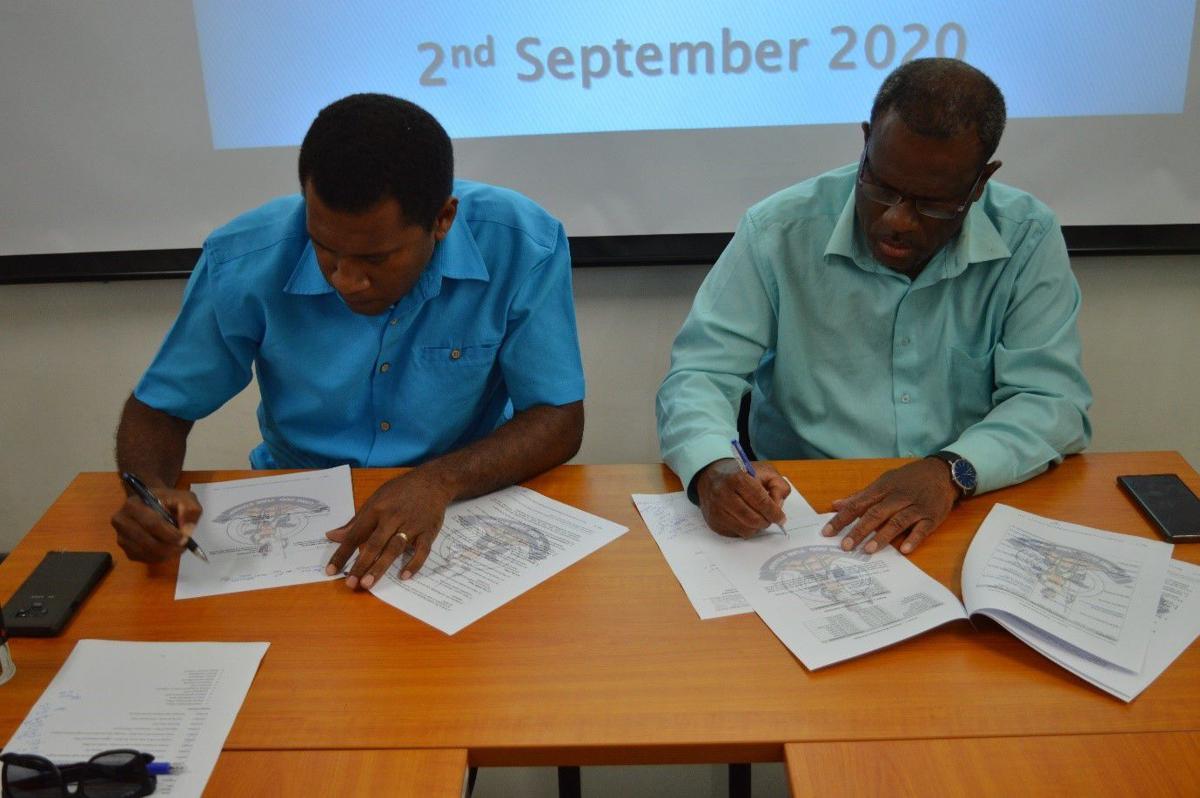On Wednesday this week,the Chief Information Officer of the Office of the Government (OGCIO), Gerard Metsan, the Chairperson of the Vanuatu Trade Facilitation Steering Committee (TFSC) and the Director of the Department Customs and Inland Revenue (DCIR), Harold Tarosa, signed a historic Memorandum of Understanding (MOU) in relation to the security, maintenance and sustainability of the Vanuatu Electronic Single Window (VeSW) system.
In outlining the preamble of the MOU, the Manager of the Vanuatu Single Window Project, Stanley Trief, explained that the TFSC has the mandate to implement trade policies and coordinate trade facilities across the government and private sector. TFSC will provide the appropriate mechanism for cooperation between key government bodies involved in trade facilitation, private sector organizations and relevant civil society organizations. Established under article 23 of the Trade Facilitation Agreement, the TFSC meets a minimum of four times a year, and report directly to the National Trade Development Committee (NTDC).
The main focus of the office of the Government Chief information Officer (OGCIO) is to lead the IGov Initiative, (the Integrated Government Initiative), which uses world-class e-government solutions and ICTs to bring better service delivery methods to all ministries and agencies, and ultimately to Vanuatu’s residents and businesses. That both the TFSC and the OGCIO are members of the NTDC, chaired by the Minister of Tourism, Trade, Commerce and Ni-Vanuatu Business, while recognizing that the Vanuatu
Electronic Single (VeSW) System is paramount to the collection of Government revenue, facilitation of the movement of goods and people across Vanuatu borders, and protecting borders, while at the same time collecting vital Government trade, revenue and travellers statistics.
He also noted in the preamble of the MOU that the Government Agencies currently using the VeSW system in Vanuatu are Customs, Immigration, Biosecurity, Tourism, Police, Financial Intelligence Unit, National Statistics Office, Environment,, Energy and Industry as at the same time, other agencies to be using the system in the next phase of the VeSW system are Telecommunications, Radiocommunications and Broadcasting Regulator (TRBR), Ifira Ports and Development Services (IPDS), Finance, Health and Civil Status, and others subject to future Government trade policies.
He continued to explain in the preamble that recognizing the VeSW System is therefore a multiple agency system with currently over 300 users across the Government and Private Sector, with the numbers expected to grow with the planned increased agencies to be connected in the future and in this regard, both institutions agreeing that every effort must be made by the OGCIO to secure, maintain and sustain the VeSW system as outlined in the terms and conditions of the MOU, that was signed on Wednesday.
Mr. Trief also outlined the history of the Automated System for Customs Data (ASYCUDA).
The ASYCUDA system (Automated System for Customs Data) was first implemented in Vanuatu in 1999 under the directorship of Mr. Sumbue Antas, Director of Customs and Inland Revenue,” Manager Trief explained. “Funded by AusAID, ASYCUDA was implemented in the three countries of Fiji, Samoa and Vanuatu.
“The version of ASYCUDA implemented in Vanuatu back in 1999 was called ASYCUDA++. It was used primarily by Customs to facilitate clearance of imported and exported goods, collect Government revenue and trade statistics, successfully serving Customs for over 10 years, Customs began consultations with UNCTAD to replace the ASYCUDA++ system with the modernized version of ASYCUDA called ASYCUDA World. Being a DOS based system (Disk Operating System) it was not possible to expand ASYCUDA++ to embrace the evolving world of technology, nor the evolving trading environment. These shortfalls have therefore compelled the Government of Vanuatu to invest in the Vt100 million ASYCUDA World Project (2016-2018), to upgrade the Customs automated system to a modernized system.
“Upgrading the system to ASYCUDA World, meant that it is now possible to further include other agencies who are involved with the movement of goods and people across the borders. On that note, the first ever Passenger processing module was created in the system in 2018 to assist Immigration and Customs facilitate the movement of people across our borders.
“Further to this the Single Window Project was established in 2019 to automate the process of issuing permits and certificates by Government agencies concerned. Now scheduled to be completed at the end of December 2021, the Project was kindly funded by EIF (Enhanced Integrated Framework) and Australia for an amount of USD2million.
“Using the ASYCUDA World system as the base platform, the first module to be created in the Single Window System was the SPS module to facilitate the processing of permits and certificates by Biosecurity. This Module was successfully implemented in March 2020.
“The next Government departments to be connected to the Single Window System under the current Project are Energy, Environment and Industry.
“Due to the increased importance of the system in the Government and Private Sector, the Trade Facilitation Steering Committee agreed with the Office of the Government Chief Information Officer to sign a Memorandum of Understanding for the maintenance and sustainability of the system. Hence the event of 2nd September which saw the two entities signing this historical Memorandum of Understanding between the two parties which will pave the way for the future of the system in Vanuatu.”
Source : Daily Post



